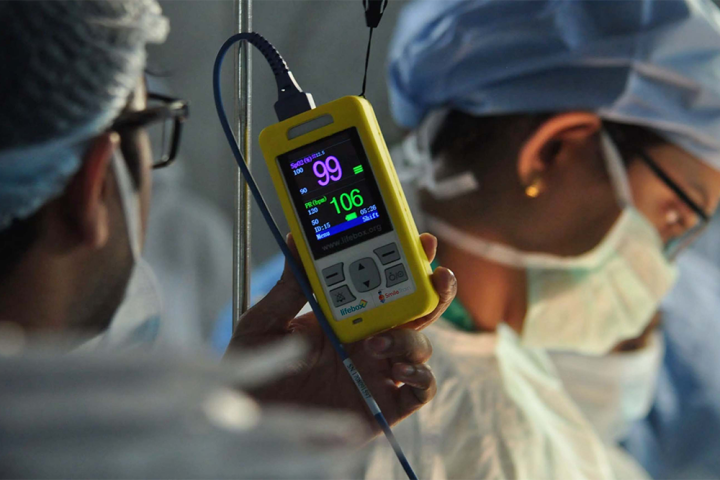Announcing the Lifebox-Smile Train Pulse Oximeter
11,000 new devices will save lives

Today we launch the Lifebox-Smile Train pulse oximeter with our long-standing partner Lifebox to scale up access to pulse oximetry for anesthesia and critical care.
Pulse oximeters rapidly measure the oxygen level of the blood and are essential for patient monitoring during anesthesia and in intensive care. This easy-to-use device is the only piece of equipment included on the WHO Surgical Safety Checklist and represents the minimum standard for safe anesthesia.
As part of the Smile Train-Lifebox Safe Surgery and Anesthesia Initiative, we will distribute 11,000 pulse oximeters across 20 countries to make 14 million surgeries safer over the next three years.
“For more than a decade Smile Train has worked with Lifebox to equip hospitals across the globe with essential monitoring tools for children undergoing surgery. We are thrilled to deepen our impactful anesthesia work with Lifebox. The launch of the Lifebox-Smile Train pulse oximeter reflects our commitment to make surgery safer for every child with cleft," says Susannah Schaefer, Smile Train President and CEO
Smile Train was a founding partner of Lifebox in 2011, distributing 2,000 pulse oximeters to its global network for safer anesthesia. In the years since, Lifebox has distributed more than 32,000 pulse oximeters to frontline healthcare providers, including 8,800 devices as part of a coordinated COVID-19 response by Smile Train and Lifebox for the identification and management of COVID-19 patients.
In conjunction with the launch of the Lifebox-Smile Train pulse oximeter, we release our report, “A Critical Gap: Pulse Oximetry In Low- And Middle-Income Countries", which covers the global ‘pulse oximetry gap’ with accounts from anesthesia providers across Africa. Read the report here.
Despite their low cost, thousands of operating rooms and recovery beds still lack pulse oximetry, putting millions of lives at risk. A recent study shows that 15% of operating beds in low and lower-middle income countries lack a pulse oximeter, with 42% of recovery beds unable to provide vital monitoring after surgery.
“In Africa, we bear an inequitable share of perioperative mortality. In my country, Kenya, many hospitals still do not have access to pulse oximetry despite it being an essential device. If you do not have a pulse oximeter, you cannot provide safe surgery for your patient: It’s as simple as that. I am overjoyed to see Smile Train and Lifebox commit to improving pulse oximetry access," says Dr. Zipporah Gathuya, pediatric anesthesiologist, Nairobi Hospital, Kenya and Smile Train Medical Advisory Board member
The Lifebox-Smile Train pulse oximeter is a low-cost, hospital-grade device for use in low-resource settings, with sturdy construction and rechargeable batteries that stay on when the power fails. If your hospital lacks pulse oximeters for anesthesia monitoring contact Lifebox at oximeters@lifebox.org.
“This will save lives. It is impossible to overstate the transformative impact that a pulse oximeter has on the safety of a patient during and after surgery. I am enormously proud of Smile Train and Lifebox committing to addressing this critical gap in the safety of surgery and anesthesia,” says Kris Torgeson, Lifebox Global CEO.
